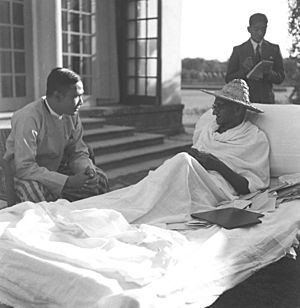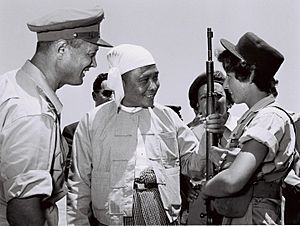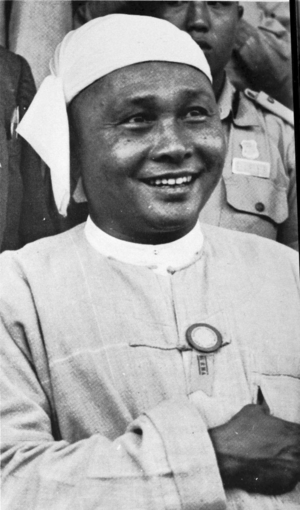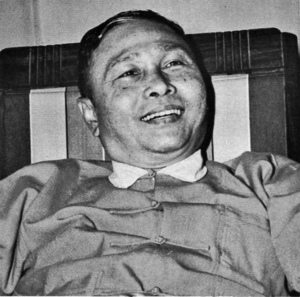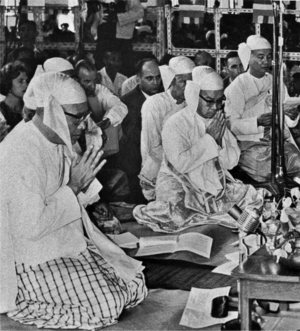U Nu facts for kids
Quick facts for kids
U
Nu
ဦးနု |
|
|---|---|
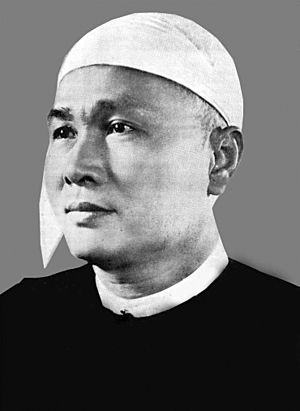 |
|
| Prime Minister of Burma | |
| In office 4 April 1960 – 2 March 1962 |
|
| President | Win Maung |
| Preceded by | Ne Win |
| Succeeded by | Ne Win |
| In office 28 February 1957 – 28 October 1958 |
|
| President | Ba U |
| Preceded by | Ba Swe |
| Succeeded by | Ne Win |
| In office 4 January 1948 – 12 June 1956 |
|
| President | Sao Shwe Thaik Ba U |
| Preceded by | Office established Aung San as Premier of British Crown Colony of Burma |
| Succeeded by | Ba Swe |
| Personal details | |
| Born | 25 May 1907 Wakema, Myaungmya District, British Burma |
| Died | 14 February 1995 (aged 87) Bahan Township, Yangon, Myanmar |
| Nationality | Burmese |
| Political party | Union Party |
| Other political affiliations |
AFPFL (before 1958) |
| Spouse |
Mya Yi
(m. 1935; died 1993) |
| Children | San San Nu Thaung Htaik Maung Aung Than Than Nu Khin Aye Nu |
| Alma mater | University of Rangoon |
|
Religion
|
|
Nu (Burmese: ဦးနု; pronounced: [ʔú nṵ]; 25 May 1907 – 14 February 1995), often called U Nu, was an important leader and politician from Burma (now Myanmar). He was the first Prime Minister of Burma after the country became independent. He served from 1948 to 1956, again from 1957 to 1958, and finally from 1960 to 1962.
Contents
About U Nu's Life
U Nu was born in Wakema, a town in British Burma, to U San Tun and Daw Saw Khin. He went to Myoma High School in Yangon. Later, he earned a degree from Rangoon University in 1929. In 1935, while studying law, he married Mya Yi.
U Nu's Political Journey
Fighting for Independence
U Nu's political journey began when he became the president of the Rangoon University Students Union. He and Aung San, another important leader, were expelled from the university. This led to a big student strike in 1936.
- Joining the Nationalists: After being expelled, U Nu and Aung San joined a group called the Dobama Asiayone (Our Burma Association). Members of this group used the title 'Thakin', meaning 'Master', to show they believed Burmese people should be masters of their own land.
- Changing His Title: After Burma became independent in 1948, U Nu stopped using 'Thakin'. He said it was no longer needed because Burma was free. He then became known as 'U Nu', where 'U' is a respectful title like 'Mr'.
- Forming Key Groups: In 1937, he helped start the Nagani (Red Dragon) Book Club. This club helped spread ideas about fairness and equality by translating important books into Burmese. He also helped create the People's Revolutionary Party (PRP), which later became the Socialist Party. He was also a leader in the Anti-Fascist People's Freedom League (AFPFL). This large group worked to make Burma independent from both Japanese and British control during the 1940s.
- During World War II: U Nu was held by the British government in 1940. When Japan took over Burma, he became the foreign minister in the Japanese-backed government. Later, he became the minister of information.
- After the War: After Japan surrendered, U Nu took a break from politics. He wrote books about his experiences during the war. However, he was soon drawn back into politics because he was a popular figure and had strong connections with other leaders like Aung San.
After Aung San and his cabinet were sadly killed in 1947, U Nu took over leadership of the AFPFL. He then signed an agreement with the British Prime Minister, Clement Attlee, to gain Burma's independence.
Leading the New Nation
Burma became independent from Britain on 4 January 1948. U Nu became the first Prime Minister of the new country.
- Challenges as Prime Minister: He faced many challenges, including armed groups from different ethnic backgrounds and communist groups. There were also exiled Chinese soldiers (Kuomintang) who had set up bases in eastern Burma. It took several years to remove them.
- Building the Country: During the 1950s, U Nu worked on the Pyidawtha Plan. This was a national plan to develop the economy and create a welfare state in Burma. A welfare state is a country where the government helps its people with things like healthcare and education.
- Democratic Elections: Under U Nu, Burma had a democratic system with several parliamentary elections.
- Stepping Down and Returning: In 1956, he chose to step down from being Prime Minister. Ba Swe took his place for a year. U Nu returned to power in 1957. In 1958, he asked the Army Chief, General Ne Win, to lead a temporary government. U Nu's party won a big election in 1960, and he became Prime Minister again.
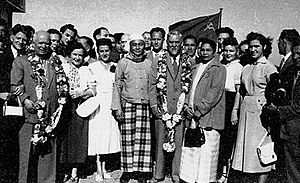
Military Rule and Resistance
In March 1962, General Ne Win led a military takeover, and U Nu was removed from power. He was held by the army for over four years.
- Seeking Change: In 1969, U Nu suggested that Ne Win should give power back to the elected government. He proposed that Ne Win could become president, but Ne Win refused.
- Leaving Burma: U Nu then left Burma and announced from London that he was still the "legal Prime Minister." He promised to continue fighting for democracy in Burma.
- Armed Resistance: U Nu formed a group called the Parliamentary Democracy Party (PDP) and led an armed resistance from the Thai border. However, his efforts to overthrow Ne Win were not successful.
- Returning Home: In 1980, U Nu accepted an offer from Ne Win to return to Burma without facing serious accusations.
The 8888 Uprising
After returning, U Nu mostly stayed out of politics and taught about Buddhism. But in 1988, during a large protest movement known as the 8888 Uprising, he became active again.
- Forming a New Party: He formed a new political party called the League for Democracy and Peace (LDP). He again stated that he was the "legal Prime Minister."
- Attempt at Interim Government: U Nu tried to form a temporary government and invited other opposition leaders to join. However, Aung San Suu Kyi, another key opposition figure, did not support his plan.
- House Arrest: When the military took full control in September 1988, they asked U Nu to stop claiming to be the Prime Minister. When he refused, he was placed under house arrest in December 1989. He was released in April 1992.
U Nu's Religious Work
U Nu was a very religious Theravada Buddhist. He was seen as a spiritual leader in Burma.
- Promoting Peace: In 1950, during a time of conflict, U Nu tried to bring peace by touring Buddhist relics around the country. He hoped the power of the Buddha would inspire peace.
- Building Religious Sites: He had the Kaba Aye Pagoda and the Maha Pasana Guha (Great Cave) built in 1952. These were prepared for the Sixth Buddhist Synod, a major Buddhist meeting that he hosted from 1954 to 1956.
- State Religion: In 1961, U Nu helped pass a law that made Buddhism the official state religion of Burma. This meant that Buddhist holidays became official days off, and government schools taught Buddhist scriptures to Buddhist students. It also banned the killing of cattle.
- Changes by Ne Win: When General Ne Win took over in 1962, he quickly removed these Buddhist laws. This was partly because these laws had upset Christian ethnic minority groups in Burma.
U Nu's Books and Plays
U Nu was also a talented writer. He wrote several books, some of which were translated into English.
- Famous Works: His books include The People Win Through (1951) and Burma under the Japanese (1954). His autobiography, Ta-Tei Sanei Tha (Naughty Saturday-born), tells his life story up to 1962.
- Translations: In the 1930s, he translated Dale Carnegie's famous book, How to Win Friends and Influence People, into Burmese.
- Plays: U Nu also wrote plays. His play The Sound of the People Victorious (Ludu Aungthan) was about how communist ideas could affect a family. It became a popular comic book and even a film. Another play, Thaka Ala, criticized corruption among politicians and communist leaders.
- Promoting Literature: He helped create the Burma Translation Society, which published the first volume of the Burmese Encyclopedia in 1954.
U Nu's Passing
U Nu passed away peacefully at his home in Yangon on 14 February 1995, at the age of 87. His wife, Mya Yi, had passed away two years earlier. They had five children together.
See also
 In Spanish: U Nu para niños
In Spanish: U Nu para niños
 | Frances Mary Albrier |
 | Whitney Young |
 | Muhammad Ali |


